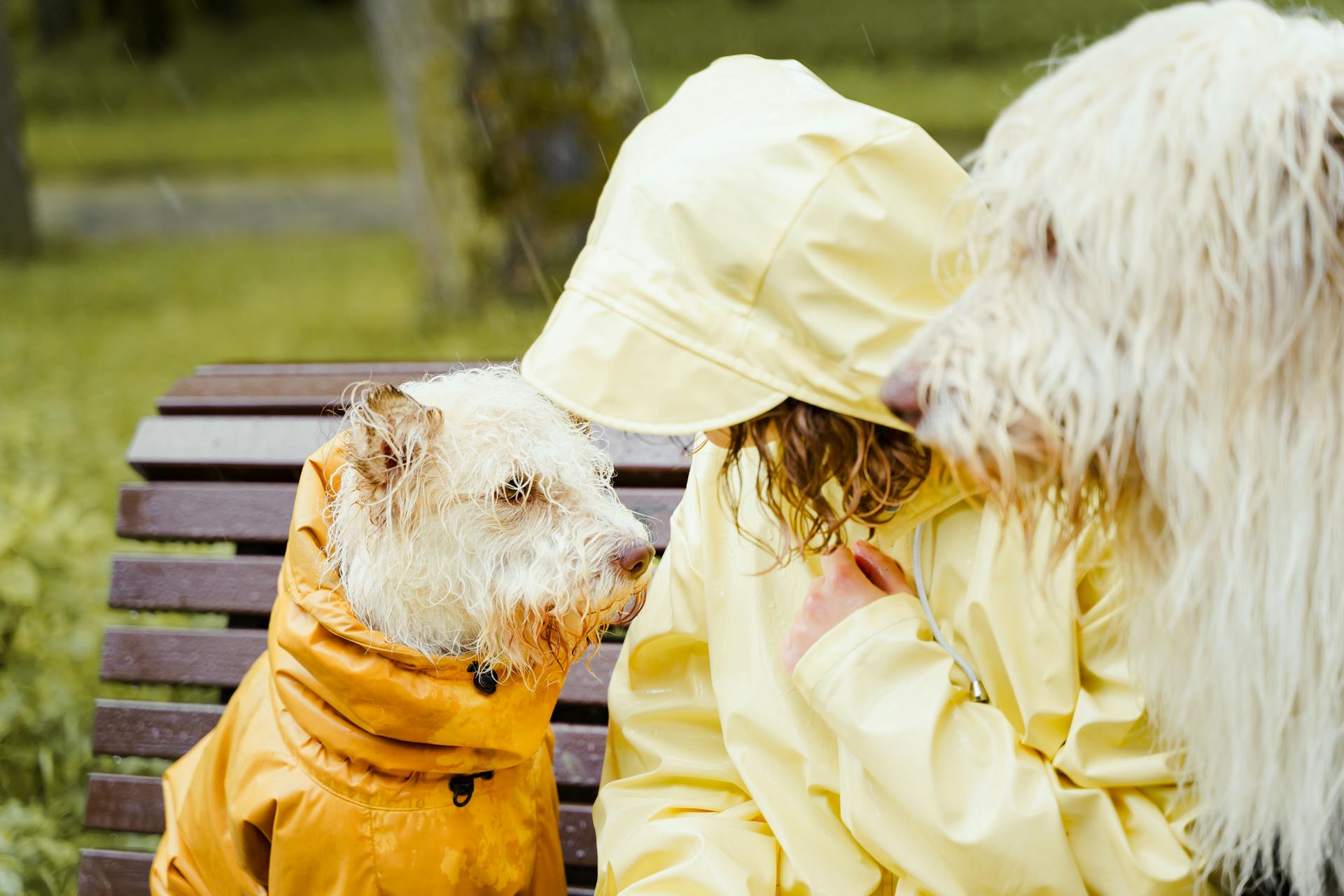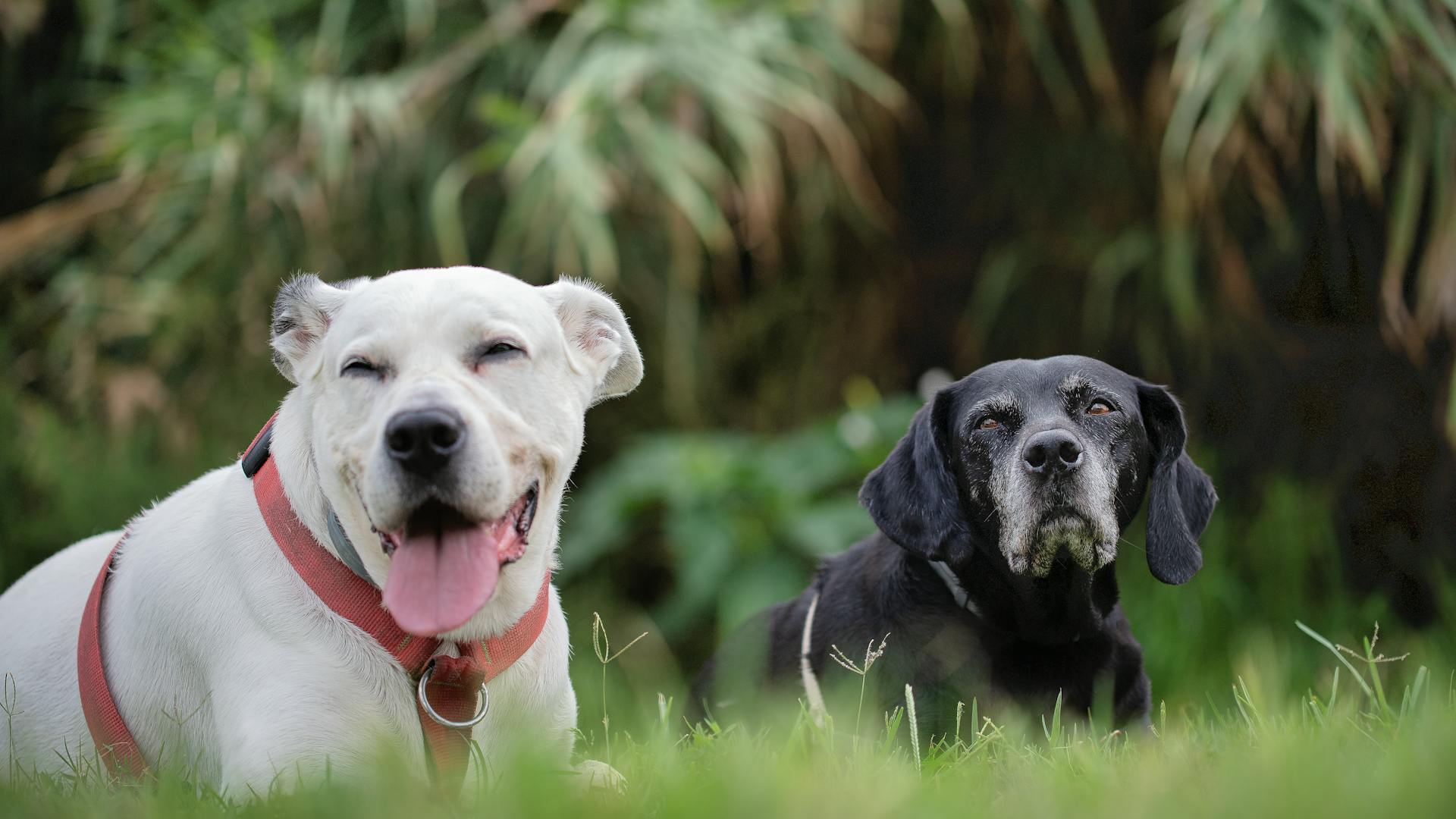
Dogs eating ice cream might seem like a harmless treat, but it's essential to consider the potential risks. Many commercial ice creams are toxic to dogs due to the presence of ingredients like chocolate, xylitol, and macadamia nuts.
Some ice creams can cause vomiting, diarrhea, and even seizures in dogs. In severe cases, it can lead to liver failure.
If you still want to give your dog a cool treat, consider making your own dog-friendly ice cream at home using healthy ingredients like peanut butter, banana, and yogurt. These ingredients are safe for dogs and can be a tasty alternative to commercial ice cream.
Feeding Dogs Ice Cream
Feeding dogs ice cream can be a fun treat for them, but it's essential to do it safely.
Dog ice cream generally comes in a one-size-fits-all cup that might not be the right serving size for every dog.
For smaller dogs, it's best to let the ice cream soften a bit, so you can cut it in half or into quarters to better suit their size.
A larger dog can have the entire cup, but remember that dog ice cream is a treat and should be given once or twice a week – not daily.
When introducing ice cream to your dog's diet, start out serving small portions and slowly to see how well they tolerate it.
This will help you identify any potential issues before they become a problem.
Keep an eye out for signs of lactose intolerance, such as stomach aches, loose stool, diarrhea, vomiting, and gas.
If you notice any of these symptoms, stop feeding dog ice cream immediately and contact your vet for advice.
Some dogs may also have food allergies to proteins in milk, which can result in vomiting, diarrhea, and/or rashes that make their skin itchy and red.
Safety and Risks
Dogs can't break down lactose, a sugar commonly found in dairy products, which can cause vomiting and diarrhea.
Dogs are prone to lactose intolerance, leading to uncomfortable abdominal cramps, vomiting, and diarrhea.
The high sugar content in ice cream can contribute to weight gain, obesity, and diabetes in dogs.
Excessive sugar intake can also cause digestive issues in dogs.
The high fat content in ice cream can be difficult for some dogs to digest and may lead to pancreatitis, a serious inflammation of the pancreas.
Certain ice cream flavors and toppings contain ingredients toxic to dogs, like chocolate, xylitol (a sugar substitute), and artificial sweeteners.
If your dog eats ice cream with toxic ingredients, your veterinarian may need to induce vomiting.
If you suspect your dog has eaten ice cream with toxic ingredients, call your veterinarian or an animal poison control hotline, such as the ASPCA's Animal Poison Control or the Pet Poison Helpline, immediately.
Dogs can also be allergic to dairy products, causing diarrhea and skin rashes.
Here are some toxic ingredients found in ice cream that can harm your dog:
- Chocolate
- Xylitol (a sugar substitute)
- Raisins
- Artificial sweeteners
If you have any questions about an ingredient your dog ate, call your veterinarian immediately.
Healthy Options
If you're looking for healthy alternatives to ice cream for your furry friend, there are plenty of delicious and dog-safe options available.
Frozen fruits like blueberries, strawberries, and bananas are a great choice - simply freeze them and serve as a refreshing treat.
You can also make your own dog-safe ice cream at home using ingredients like bananas, peanut butter, and yogurt.
Frozen yogurt with live and active cultures is another great option, providing probiotics that aid digestion.
Frozen broth popsicles made with low-sodium chicken or beef broth are a hydrating and flavorful treat for your dog.
Here are some safe fruits for dogs to enjoy:
- Apples
- Blueberries
- Strawberries
- Watermelon
- Banana
- Pineapple
Remember to always check with your vet before introducing new foods to your dog's diet, and to start with small portions to ensure they can tolerate the new treat.
Make-at-Home Birthday Cake Treats
If you're looking to make your dog's next birthday party extra special, consider making a make-at-home birthday cake treat that's safe and healthy for them.
The Lazy Dog Cookie Co. offers a make-at-home ice cream mix that's specifically designed for dogs, using pup-friendly ingredients like dried milk and vanilla.
You can also try making a DIY frozen 'pupsicle' treat by blending together frozen fruit like apples, blueberries, strawberries, watermelon, banana, and pineapple.
Some safe fruits for dogs include apples, blueberries, strawberries, watermelon, banana, and pineapple.
To make a DIY frozen 'pupsicle' treat, simply blend together your chosen fruits and freeze them in an ice cube tray. You can also add a few slices of organic apples and a splash of organic chicken broth or bone broth for extra flavor and nutrition.
Here's a simple recipe to get you started:
- Sliced organic apples (make sure there are no seeds)
- Organic chicken broth or bone broth
- Ice cube tray
Remember to always confirm that the ingredients you use are safe for your dog, and to serve the treats in moderation to avoid digestive upset.
Precautions and What to Do
If your dog eats ice cream, it's essential to monitor their health closely. If you notice any signs of lactose intolerance, such as stomach aches, loose stool, diarrhea, vomiting, or gas, stop feeding ice cream immediately and contact your vet for advice.
To be safe, start by serving ice cream in small portions and slowly to see how well your dog tolerates it. This will help you gauge their sensitivity to dairy.
If your dog eats a large amount of ice cream or develops more serious symptoms, it's crucial to seek veterinary attention. The severity of the reaction depends on the amount consumed and your dog's individual sensitivity.
If you're unsure about what to do, call your veterinarian or a pet poison hotline like the ASPCA's Animal Poison Control or the Pet Poison Helpline.
What If You Eat?
If you accidentally eat ice cream, it's unlikely to cause any harm. However, if your dog eats ice cream, it's a different story.
The severity of the reaction depends on the amount of ice cream consumed and your dog's individual sensitivity. Small amounts might cause mild digestive upset like gas or diarrhea, but larger quantities or ice cream containing harmful ingredients can lead to more serious health problems requiring veterinary attention.

If your dog eats ice cream, try not to panic. Most dogs will develop an upset tummy which will settle after a few days of bland food.
Examples of bland food you could offer are boiled chicken and rice, plain pasta, scrambled egg, or white fish. However, if your dog has severe vomiting and diarrhea or isn’t eating or drinking, they could become dehydrated.
If your dog develops itchy skin or a rash after eating ice cream, and it doesn’t improve within twenty-four hours, they might need to see a veterinarian. One of our veterinarians will be able to prescribe anti-itch or anti-allergy medications to help your furry friend feel more comfortable.
Here are some signs of a potentially serious reaction:
- Severe vomiting and diarrhea
- Not eating or drinking
- Itchy skin or a rash that doesn’t improve within twenty-four hours
- Hives or swelling
If you notice any of these signs, contact your vet for advice and an appointment to ensure your furry friend gets the help they need.
What to Do After Eating Something Bad

If your dog ate something bad, don't wait to call your veterinarian for guidance. Your vet will be able to tell you what to do and if your dog needs to come in for treatment.
Call your veterinarian right away if you have any questions about an ingredient your dog ate. They'll help you figure out the best course of action.
If you can't get through to your vet, call the ASPCA's Animal Poison Control or the Pet Poison Helpline for help. They'll be able to guide you through the next steps to keep your dog safe.
General Information
Dogs can eat some frozen treats, but ice cream is not a good option. It's essential to choose healthy and safe options for your furry friend.
Dogs can't have ice cream due to its high sugar and fat content, which can cause stomach upset and other health issues. This is according to PetMD and the American Kennel Club, two trusted sources.
To keep your dog happy and healthy, consider dog-friendly frozen treats instead of ice cream. This will help strengthen your bond with your dog and ensure they stay healthy for years to come.
Some dog-friendly frozen treats include peanut butter and banana bites, sweet potato chews, and yogurt drops. These treats are not only delicious but also nutritious and safe for your dog to eat.
You might enjoy: Dog Eating Frozen Dog Poop
Frequently Asked Questions
Can dogs eat the cone of the ice cream?
Dogs can have a small amount of ice cream cone if they accidentally eat it, but it's still high in sugar and best avoided. Be cautious of xylitol, a toxic sweetener often used in cones, and keep them out of reach
Featured Images: pexels.com


